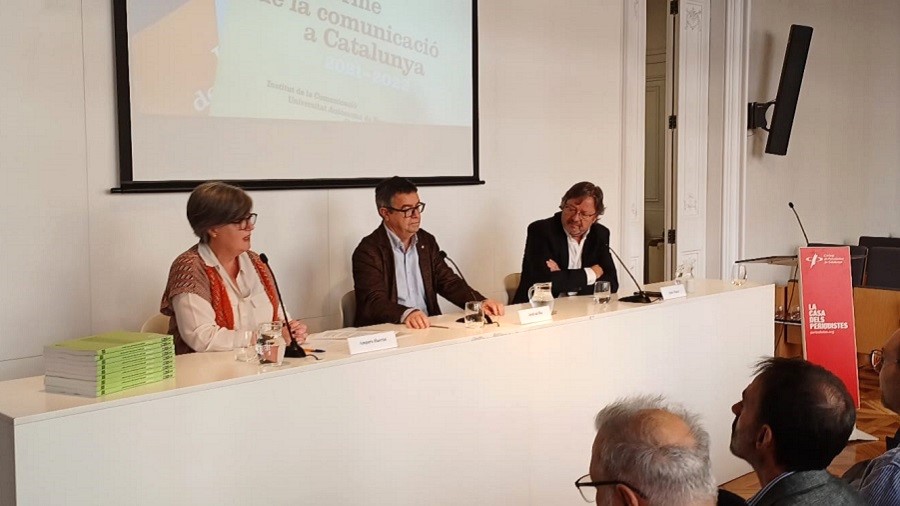InCom-UAB presents the 12th Communication in Catalonia report
The 12th edition of the Informe de la comunicació a Catalunya [Report on Communication in Catalonia], coordinated by the UAB Institute for Communication, was presented on 17 November at the headquarters of the Association of Catalan Journalists in Barcelona. The report analyses the sector's situation during the 2021-2022 biennium, a period marked by the recovery after the COVID-19 pandemic, which did not affect all sub-sectors equally.

Within the data included, the report detects a contraction of advertising revenues in traditional media, while digital media consumption is becoming consolidated: more Internet radio is listened to, subscriptions to streaming platforms are increasing, etc., and advertising expenditures are consequently focused on the digital environment. Framed within the Observatory for Communication in Catalonia (OCC InCom-UAB), this project is one of the works of the International Study Group on Communication and Culture, led by Amparo Huertas, director of the Institute of Communication at the UAB. In addition to Huertas, the report's editors are Bernat López and Luiz Peres-Neto.
The document studies in its various chapters the situation of the written press, radio, television and audiovisual platforms, cinema, books, music and video games. Obviously, digitisation is a cross-cutting process common to all sub-sectors; for example, the report explains that "Internet radio listening had about 783,000 listeners in Catalonia in 2022, which represents an increase of 25% versus the year 2021". In addition, the situation of the period 2021-2022 described by this latest Communication Report is marked by the recovery of the economic consequences of the COVID-19 pandemic, which "did not affect all sub-sectors in the same way".
Advertising revenues are a key factor in this regard. For example, "radio advertising investment has not yet recovered since the pandemic". As explained in the report's epilogue, "the contraction in traditional media advertising revenues is due to a rapid redirection of advertising investment to digital modes". It is also seeing a "growing dominance of certain digital and global platforms." In particular, Alphabet, Amazon and Meta are "concentrating advertising investment on a planetary scale". On the other hand, with regard to print media, the report notes that "the implementation of paywalls is not generating the expected volume of subscriptions, including among digital natives".
A rise in pay TV
Among the growing phenomena, the report highlights the fact that "pay TV is steadily gaining weight", as evidenced by the fact that "24.5% of Catalan households were Movistar+ customers in 2022 and, in contrast, the audience for linear television is losing strength, now in all age groups". According to the report, "series and movies have become content for which the audience is willing to pay to the point that the logic of loyalty to a channel, platform or service no longer works, but rather it is increasingly common for a household to subscribe to different catalogues". As a result, "while pay-TV and subscription video-on-demand services' shares are increasing, TV advertising revenues have been trending downwards since 2018".
In other sectors, such as music, the pandemic "has made it possible to demonstrate its capacity for transformation" and it is noted, for example, "an increase of 13% in the turnover of the Catalan recording industry in 2021". The cultural industry shows other positive symptoms, such as the fact that, "during the 2021-2022 biennium, the percentage of the population reading books has continued to grow, while reading on digital media and channels (websites, blogs, social networks, etc.) has increased".
As for the video game sector, the report reflects its growing importance: "Catalonia is home to the largest number of video game companies and studios in Spain, with 27.4%". The sector brings together 200 production centres and 3,966 professionals who "generated 552 million euros in turnover in 2021".
Catalan language in the media
The report also devotes a section to the language dimension of the Catalan communicative environment, highlighting for example that "analogue FM radio is one of the few communicative spheres in which the normalisation of the Catalan language has been consolidated", given that "71.8% of listeners listen to the radio in Catalan". In this sense, the leadership of the generalist radio stations RAC1 and Catalunya Ràdio and the role of the disconnections in Catalan of the state radio stations and of the municipal radio stations are key. However, Catalan shows a much weaker position in the video game sector: "in 2021, only 6.2% of users played in this language and only 54% of video game productions included Catalan as one of the available languages".
Finally, this latest edition of the report raises some challenges for the future, such as the need for a "media education that goes beyond digital skills and the development of a critical view" and is related "to health, given the high addictive component of many digital contents". It also discusses the treatment of the issue of climate change, concluding that "the media apply the recommendations made by groups of experts, who point out that it is necessary to address the causes, the transversality of the effects and the great diversity of adaptation and mitigation measures that can be implemented".
The UAB, with Sustainable Development Goals
Sustainable cities and communities